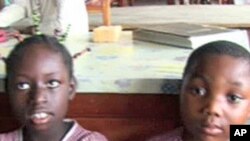Autism Spectrum Disorder is said to be the fastest growing neurobiological condition in the world. Autistic children and adults often have trouble interacting with others, are slow to learn language, and are frequently more interested in objects than people. It is hard to know how prevalent autism is in many countries because statistics are hard to come by. But we are told by the Autism Society that it affects more than one million people in China, with slightly more than a million in the United States, and as many as two million in India. But what about those in Africa?
In Africa, a lack of awareness and resources prevents many children with autism from getting help. They are stigmatized by their families and communities.
Brigitte Kobenan is the mother of an autistic child. During her reign as Miss Ivory Coast and Miss Congeniality World in recent years, she decided to make autism a central part of her platform, creating the Autism Community of Africa. She recently came to the Ivorian embassy in Washington, D.C. to talk about her own son. She says he often sat in a corner at home, lost in his own world.
"He was spinning objects, he would just look at a fan spinning and he would go around and around, he would line up toys, you know, instead of playing with them," Kobenan explained.
Kobenan decided she wouldn't hide him away from society, regardless of his condition. Instead, she led by example. Soon people noticed.
"I had a woman who…came to my mom and said because of your daughter I can take my child out. I am not ashamed anymore," she said. "We look at this woman with a worldwide crown and she is not afraid of showing her son, so why should I hide mine?"
Dawn Cooper Barnes is the wife of the Liberian ambassador in Washington. She is also the mother of a 19-year-old autistic boy. She says she finds many Africans are superstitious when it comes to autism.
"Children in Africa living with autism may be thought to being possessed by the evil spirit or bad omens," she said.
She says people just need to be better informed.
"What we need is more information. What is autism? How does it affect children? What can we do to help children with autism? We need to dispel some of the myths that are surrounding mental illness and mental conditions in Africa," Barnes said.
For Jeff Sell, the vice president of the World Autism Organization, recent data on the prevalence of autism is alarming.
"When my boys were born, it was one in a 1,000, now it's one in a 100. We have a worldwide epidemic, we have a worldwide problem," he noted.
There is growing awareness about autism in Africa and the need for treatment facilities. In Cameroon, for example, centers now provide specialized care for this developmental disorder.
But Brigitte Kobenan says many more facilities are needed. She hopes to build a new treatment center in her own country, Ivory Coast, with money raised during her event in Washington.




